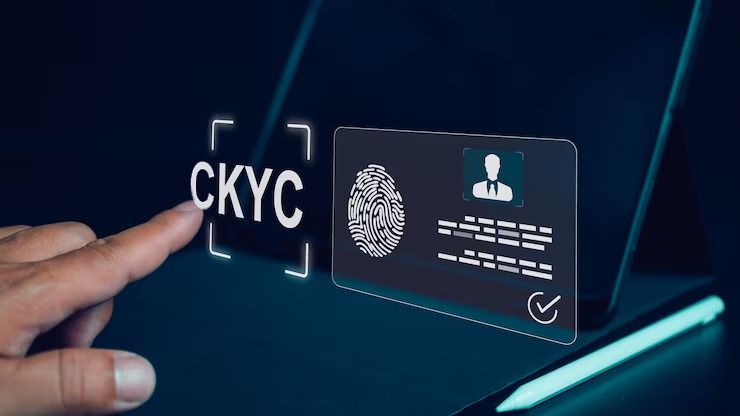What Is CKYC and Why Does It Matter for Financial Institutions in India

Complete Guide to CKYC
India’s financial sector is undergoing a significant shift in customer verification, thanks to the introduction of the CKYC. As of December 2023, over 82 crores of KYC records have been digitized, helping banks, NBFCs, and investment firms reduce duplication. This centralized approach has cut onboarding time by 90% and slashed operational costs by 70%. With the increasing value of financial fraud every year, the Reserve Bank of India mandated CKYC for all regulated entities to strengthen compliance and risk management. CKYC's full form is Central Know Your Customer. Let’s explore this in detail.
What is CKYC?
Introduced by the government in 2016 under the Prevention of Money Laundering Act of 2002, the centralized KYC or CKYC solution was created to streamline the verification process for financial transactions, such as loan sanction, insurance underwriting, and mutual fund investments.
Managed by the Central Registry of Securitisation, Asset Reconstruction and Security Interest (CERSAI), CKYC eliminates the need to furnish KYC documents, such as identity and address proof, each time the customer performs a financial transaction where KYC submission is mandatory, as the details are already stored in the database.
How Does CKYC Work?
When a customer completes their KYC with a regulated financial institution, the institution collects and verifies the necessary documents, which are then securely uploaded to the Central KYC Registry (CKYCR), overseen by CERSAI. In return, the customer gets a unique 14-digit CKYC identifier. This number securely stores the relevant details in a central database, such as the customer's name, address, date of birth, and identity proof. Once the KYC is registered, other regulated entities can retrieve customers' information using the CKYC number, avoiding the need to do the KYC again.
Who Can Register Customers for CKYC?
Financial institutions regulated by these bodies can proceed with customer’s CKYC registration:
- Securities and Exchange Board of India (SEBI)
- Insurance Regulatory and Development Authority (IRDA)
- Reserve Bank of India (RBI)
- Pension Fund Regulatory and Development Authority (PFRDA)
Why CKYC Matters for Financial Institutions in India?
When it comes to financial institutions, understanding the CKYC meaning is crucial, as it holds the following relevance.
Cross-Sector Onboarding
Financial institutions, including banks, insurance companies, NBFCs, and those involved in mutual funds, can access the same CKYC data. This interoperability allows institutions to onboard customers quickly, even if the customer originally submitted KYC to a different type of financial service provider. It ensures faster conversion without requiring repetitive document submissions.
Risk-Based Profiling
Since CKYC includes structured data on customer identity, address, and financial relationships, institutions can better evaluate and profile customers during onboarding. This helps categorize clients based on risk, enabling customized due diligence instead of following a one-size-fits-all compliance model, which is especially useful in high-risk sectors like wealth management.
Fraud Detection
CKYC utilizes advanced features, including digital fingerprinting (also known as hashing). When a person attempts to submit tampered or duplicate documents across different financial entities, the system automatically detects discrepancies and flags them. This ensures that fraudulent attempts, such as using forged identity proofs for opening multiple accounts or availing loans, are identified early. As all financial institutions access a centralized KYC registry, it becomes much harder for scammers to exploit gaps between banks or NBFCs.
Prevents Duplicate Records
CKYC assigns a unique 14-digit KYC Identifier linked to each individual. This ensures that institutions do not create multiple customer records for the same individual due to name mismatches or minor address variations. It supports better customer relationship management and prevents data fragmentation within institutions.
Instant Digital Lending
For institutions involved in digital lending, time is crucial. Accessing pre-verified CKYC data enables near-instant KYC verification, reducing friction in mobile-based loan applications. It supports fully digital journeys, especially for pre-approved loans and micro-lending apps.
AML Monitoring
AML (Anti-Money Laundering) monitoring is one of the CKYC processes in which financial institutions track customer transactions to detect and prevent illegal activities, such as money laundering. CKYC data plays a vital role in this by offering a centralised database of verified identity and address details. This enables banks and institutions to efficiently monitor unusual or suspicious activities across multiple accounts held by the same customer, thereby enhancing compliance with AML and strengthening overall financial security.
Efficient Blacklisting
If a customer is blacklisted or flagged for suspicious activity, their CKYC record can be updated with relevant remarks. This updated information is accessible to other institutions, helping them avoid onboarding high-risk customers unknowingly. It improves industry-wide vigilance and safeguards against system abuse.
Conclusion
CKYC is a vital framework for financial institutions in India. It enhances customer onboarding, strengthens compliance, and reduces redundancy across banking, insurance, mutual funds, and lending services. By offering a centralized view of verified customer data, CKYC enables institutions to make better-informed decisions while meeting regulatory expectations.
For banks and financial service providers seeking a reliable way to manage CKYC uploads and streamline operations, Manipal Business Solutions’ CKYC Solution offers a proven, end-to-end platform. With a 99.9% success rate and over six crore CKYC records processed, MBS helps compliance, operations, and business teams ensure seamless data management on the CERSAI portal.
To learn more about Manipal Business Solutions’ offerings, reach out to us today.